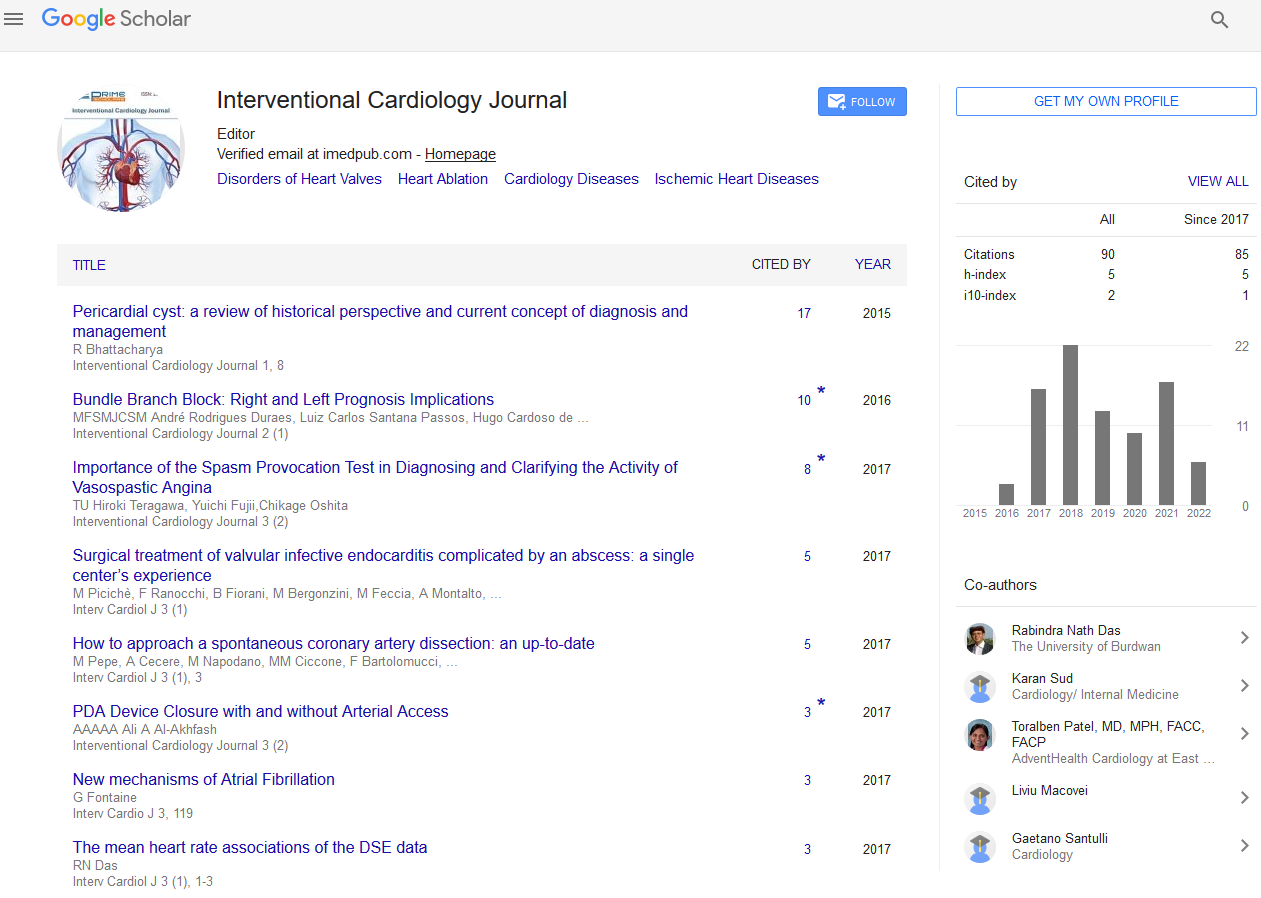Commentary - (2023) Volume 9, Issue 8
Diving into Atrial Flutter: Exploring its Origins and Underlying Causes
Marcus Nik*
Department of Experimental, University of Bologna, Italy
*Correspondence:
Marcus Nik,
Department of Experimental, University of Bologna,
Italy,
Email:
Received: 01-Aug-2023, Manuscript No. IPIC-23-18068;
Editor assigned: 03-Aug-2023, Pre QC No. IPIC-23-18068 (PQ);
Reviewed: 17-Aug-2023, QC No. IPIC-23-18068;
Revised: 22-Aug-2023, Manuscript No. IPIC-23-18068 (R);
Published:
29-Aug-2023, DOI: 10.21767/2471-8157.9.8.75
Description
Atrial flutter is a common cardiac arrhythmia characterized by
rapid and regular electrical impulses in the heart's atria. This
condition disrupts the heart's normal rhythm, leading to symptoms
like palpitations, shortness of breath, and fatigue. Atrial
flutter requires prompt diagnosis and management to prevent
potential complications, such as stroke or heart failure. Imbalances
in thyroid hormones, especially hyperthyroidism, can trigger
atrial flutter. Conditions like Chronic Obstructive Pulmonary
Disease (COPD) can strain the heart and contribute to arrhythmias.
Scar tissue from previous cardiac surgeries can disrupt
the heart's electrical pathways. Excessive use of stimulants like
caffeine, alcohol, and certain medications can increase the risk
of atrial flutter. Atrial flutter becomes more common with advancing
age, especially beyond 60 years. Antiarrhythmic medications
can help maintain a normal heart rhythm. In some cases,
a pacemaker or Implantable Cardioverter-Defibrillator (ICD)
might be recommended to manage the arrhythmia. Adopting a
diet rich in fruits, vegetables, whole grains, lean proteins, and
healthy fats supports heart health. Engaging in regular physical
activity helps maintain cardiovascular fitness and reduces the
risk of arrhythmias. Managing stress through relaxation techniques,
meditation, and hobbies can promote heart health.
Reducing the consumption of caffeine and alcohol can help
prevent triggers for atrial flutter. Living with atrial flutter can
impact an individual's quality of life, especially if symptoms
are severe or persistent. The arrhythmia might require ongoing
medical management and lifestyle adjustments. For those
whose arrhythmia occurs sporadically, a Holter monitor might
be recommended. This portable device is worn for a period
of 24 hours to 48 hours or longer, continuously recording the
heart's rhythm. It captures any transient episodes of atrial flutter
that might not be detected during a standard ECG. Similar
to a Holter monitor, an event recorder is a portable device that
individuals wear for a longer duration-usually a month or more.
It is activated by the patient when they experience symptoms.
This tool helps capture arrhythmia episodes during day-to-day
activities. An echocardiogram is an ultrasound test that provides
images of the heart's structure and function. It aids in
identifying underlying structural heart conditions that might be
contributing to the arrhythmia. An EPS involves the insertion
of catheters into the heart to evaluate its electrical pathways.
This procedure helps identify the specific area responsible for
the arrhythmia and guides treatment decisions. A pacemaker
helps regulate the heart rate, while an ICD can detect and treat
life-threatening arrhythmias. Addressing underlying conditions
that contribute to atrial flutter, such as heart disease or thyroid
disorders, is an essential part of the treatment plan. Adopting a
heart-healthy diet rich in fruits, vegetables, whole grains, lean
proteins, and healthy fats can support cardiovascular health.
Engaging in regular physical activity helps maintain cardiovascular
fitness and reduces the risk of arrhythmias. Managing
stress through relaxation techniques, meditation, and hobbies
can support heart health. Reducing the consumption of caffeine
and alcohol can help prevent triggers for atrial flutter. Adhering
to prescribed medications and treatment plans is essential for
effective management. Atrial flutter, while often manageable,
can impact an individual's quality of life due to symptoms and
the need for ongoing medical care. However, with timely diagnosis,
appropriate treatment, and adherence to medical
advice, individuals can experience significant improvement in
their overall well-being. Regular follow-up appointments with
healthcare providers are important to monitor progress and
make adjustments to the treatment plan as needed.
Acknowledgement
None.
Conflict Of Interest
The author’s declared that they have no conflict of interest.
Citation: Nik M (2023) Diving into Atrial Flutter: Exploring its Origins and Underlying Causes. Interv Cardiol J. 9:75.
Copyright: © 2023 Nik M. This is an open-access article distributed under the terms of the Creative Commons Attribution License, which permits unrestricted use, distribution, and reproduction in any medium, provided the original author and source are credited.

